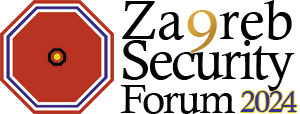
September 7-8th, 2020
5th ZAGREB SECURITY FORUM 2020
Hybrid Threats and Wars in 21st Century - Making Society and Critical Infrastructure Resilient
Organized by Hybrid Warfare Research Institute & St. George Association
Hotel Sheraton, Zagreb
Day 0: Sunday, September 6th, 2020
Dinner for Speakers, Panel Chairs, and Guests of Honor (Invitation only)
Day 1: Monday, September 7th, 2020
09:30 - 10:00 Opening Ceremony
Doc.Dr. Gordan Akrap, Hybrid Warfare Research Institute, Zagreb
Prof.Dr. Shlomo Shpiro, Bar Ilan University
Mr. Holger Haibach, Head of the Konrad-Adenauer-Stiftung Office in Zagreb
Lt. General Mate Pađen, Commandant of the Croatian Defence Academy "Dr. Franjo Tuđman"
10:00 - 10.55 Keynote Speakers
Mrs. Dubravka Šuica, Vice-President (2019-2024) of European Commission for Democracy and Demography
Dr. Deniz Beten, Senior SPS and Partnership Cooperation Advisor, NATO Emerging Security Challenges (ESC) Division
Dr. Mario Banožić, MInister of defence, Croatia
Doc.Dr. Robert Kopal, special envoy and advisor for National security of the Prime minister of Croatia
11:00-13:00 Panel I
Emerging Threats in 21st Century and Protection of Society and Democracy: Lessons from the Corona-virus Crisis
Chair: Prof.Dr. Mladen Vedriš, University of Zagreb
Dr. Vlasta Zekulić, NATO HQ: NATO's approach to countering Hybrid Threats during the COVID-19 crisis
Prof.Dr. Shlomo Shpiro, Bar Ilan University, Ramat Gan, Israel: Crisis Communication and the Resilience of Society and State
Konrad Adenauer Stiftung, HQ, Berlin, Germany
Prof.Dr. Slavko Vidović, Doc.Dr. Gordan Akrap: Reaching Digital Sovereignty - Why and How
Dr. Grzegorz Lyko, Chief of Staff, NATO Strategic Communications Centre of Excellence
13:00-14:00 Lunch (one non-alcoholic beverage included)
14:00-16:00 Panel II
Hybrid and Cyber Warfare - Threats to Freedom and Society
Chair: Doc.Dr. Gordan Akrap, HWRI, Croatia
Dr. Hrvoje Karna, Darija Jurko, Boško Jerončić-Grba,
Croatian Defence Academy, Zagreb: Analysis of the incidence and usage
of the term "hybrid war(fare)" in the digital media space of the
Republic of Croatia
Dr. Vira Ratsiborynska, Adjunct professor on NATO and transatlantic approaches to security, Free University of Brussels (VUB): Future of Russia's hybrid warfare: Analysis of different drivers and their impact on security of society
ir. Yvan de Mesmaeker, European Corporate Security Association: Protecting Critical Infrastructure against Insider Threat
Col. (ret.) Eyal Pinko, Israel: Naval Hybrid (Cyber) Warfare in Mediterranean Sea
Mr. Matjaž Prah, HEP: Security aspects of nuclear power plants
16:00-16:20 Coffee Break
16.20-18.20 Panel III
Hybrid and Cyber Warfare – International Problems and Joint Solutions
Chair: ir. Yvan de Mesmaeker, ECSA, Bruxelles
Prof.Dr. Iztok Podbregar, Prof.Dr. Polona Šprajc, University of Maribor, Slovenia: Pandemic and Restriction of Movement
mrs. Lina Aburous, Euraffex group, managing director
Prof.Dr. Aleksandra Gasztold, University of Warsaw; Dr. Przemysław Gasztold,
Institute of National Remembrance, War Studies University, Poland:
Espionage and Deception. Evolving Trends of Russian Hybrid Warfare
against Poland
Prof.Dr. Zoran Dragišić, University of Belgrade, Prof.Dr. Darko Trifunović, Director, INIS, Serbia; Mr. Darko Obradović, Secretary General, INIS, Serbia: Russian Hybrid Threats and Malign Influence to WB6 states
20:00 -
Networking dinner for all Forum participants, Hotel Sheraton (two non-alcoholic beverages included)
Day 2: Tuesday, September 8th, 2020
10:00-12.00 Panel
Future challenges, Joint Responses
Closed panel - participation by invitation only
(under Chatham house rules)
Co-chairs: Doc.Dr. Gordan Akrap, Prof.Dr. Shlomo Shpiro
Col. VIacheslav Semenenko, The Center for Military and Strategic Studies of the National Defence University of Ukraine
General Mirko Šundov, PhD
This session will discuss and integrate the lessons learned from the individual presentations of the previous day, both in terms of threat analysis and of networked responses in the aftermath of the Corona virus crisis. Furthermore, this session will facilitate a wider discussion on the needs for joint capacity building, intensive interoperability, and mutual multi-level crisis assistance especially against hybrid threats.
End of the Forum